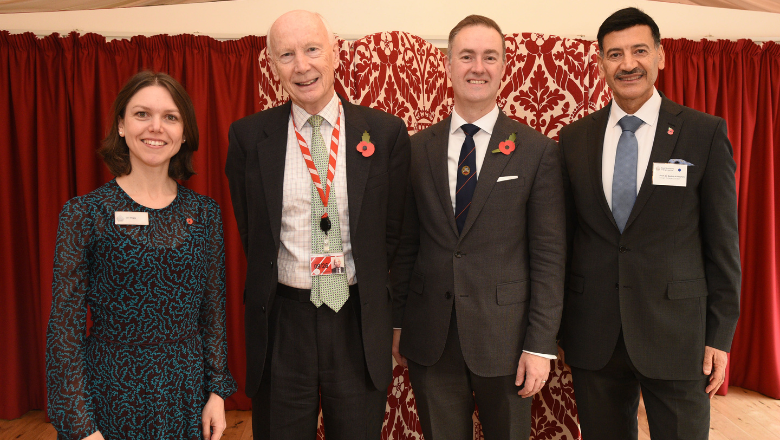We are living through a time of profound transformation. Climate change, digital disruption, infrastructure renewal and the pursuit of a fairer society all demand more from engineering and from engineers. Engineers have, and will continue to have, a leading role in creating and implementing the changes needed if the UK is to meet the economic, social and environmental challenges we now face.”
Professor Sir Bashir M. Al-Hashimi CBE FREng FRS
05 November 2025
King's celebrates engineering skills report launch in the House of Lords
Professor Sir Bashir M. Al-Hashimi CBE FREng FRS, Vice President (Research & Innovation) at King’s welcomed the Engineers 2030 Final Report in his keynote speech at the National Engineering Day Parliamentary Reception in the House of Lords.

The report, led by the Royal Academy of Engineering, on behalf of the National Engineering Policy Centre presents key findings and recommendations from the Engineers 2030 policy project, which was initiated last year to reimagine engineering and technology skills for a sustainable and inclusive future.
Professor Sir Bashir M. Al-Hashimi is Chair of the Engineers 2030 Working Group, which was responsible for the final report and comes following 18 months of consultation with employers, educators, engineers and learners.
Launched in the presence of Chris McDonald MP, Minister of Industry, Lord Robert Mair, a Crossbench Peer in the House of Lords and geotechnical engineer, and Jo Trigg, Director of Communications for the Royal Academy of Engineering, the collaborative report introduces 6 key principles and 10 recommendations to support the engineers of 2030. The principles frame engineering as a national capability requiring digital fluency, social responsibility, commercial awareness and cross-disciplinary collaboration. The recommendations are designed to support future engineering and technology skills, and include actions such as modernising curricula, simplifying apprenticeships, mapping future employer needs, improving funding for engineering education and enhancing skills recognition and development.
The Engineers 2030 project examined the kind of engineering workforce the UK needs to thrive in the future and addresses major national challenges. It focuses not only on workforce size, but on the capabilities, values and support systems required for engineers and technicians to succeed.
The recommendations will help support King’s strong track record in delivering the engineering workforce of the future, including its award-winning undergraduate curriculum that unites industry collaboration in sectors such as semi-conductors with a ‘create-first’ pedagogy that embeds hands-on practical skills alongside engineering principles and project management.
Speaking at the reception, Professor Al-Hashimi said:
“Engineers 2030 began with a simple but urgent question: what kind of engineering workforce will the UK need to thrive in the decades ahead? The answer, as this report shows, is not just about numbers. It’s about the capabilities, values and the systems that support people to learn, grow and lead as engineers and technicians.”
The new Royal Academy of Engineering Skills Centre, launching later this year, will support the implementation of these recommendations by helping colleges, universities and employers adapt to emerging technologies and evolving skills needs.
The National Engineering Policy Centre, is a partnership of 42 professional engineering organisations that provide insights, advice, and practical recommendations to help inform policy making. The centre is led by the Royal Academy of Engineering, which is a charity that delivers public benefit from excellence in engineering and technology. It is also a Fellowship that convenes leading businesspeople, entrepreneurs, innovators and academics across engineering and technology, and a National Academy providing leadership and independent expert advice to policymakers.
The full Engineers 2030 report can be found here.
